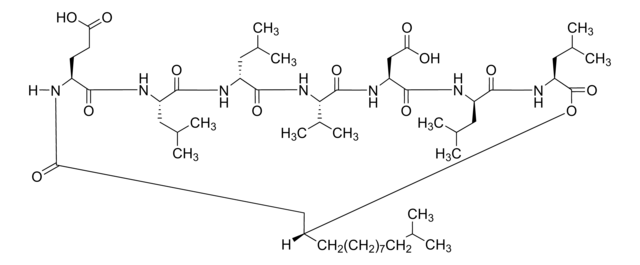R95DD
Rhamnolipids
95% (Di-Rhamnolipid dominant)
Synonyme(s) :
Rhamnolipids
About This Item
Produits recommandés
product name
Rhamnolipids, 95% (Di-Rhamnolipid dominant),
Source biologique
Pseudomonas aeruginosa
Niveau de qualité
Forme
solid/granular
Caractéristiques du produit alternatif plus écologique
Design for Degradation: Greener alternative product characteristics
Learn more about the Principles of Green Chemistry.
sustainability
Greener Alternative Product
Autre catégorie plus écologique
, Aligned
Conditions d'expédition
ambient
Température de stockage
room temp
Vous recherchez des produits similaires ? Visite Guide de comparaison des produits
Description générale
We are committed to bringing you Greener Alternative Products, which adhere to one or more of The 12 Principles of Greener Chemistry. This product has been enhanced for hydrocarbon degradation. For more information see the paper Environmental applications of biosurfacants: recent advances, and the many other articles available at: AGAE Technologies
Application
Informations légales
Code de la classe de stockage
11 - Combustible Solids
Point d'éclair (°F)
Not applicable
Point d'éclair (°C)
Not applicable
Certificats d'analyse (COA)
Recherchez un Certificats d'analyse (COA) en saisissant le numéro de lot du produit. Les numéros de lot figurent sur l'étiquette du produit après les mots "Lot" ou "Batch".
Déjà en possession de ce produit ?
Retrouvez la documentation relative aux produits que vous avez récemment achetés dans la Bibliothèque de documents.
Notre équipe de scientifiques dispose d'une expérience dans tous les secteurs de la recherche, notamment en sciences de la vie, science des matériaux, synthèse chimique, chromatographie, analyse et dans de nombreux autres domaines..
Contacter notre Service technique







